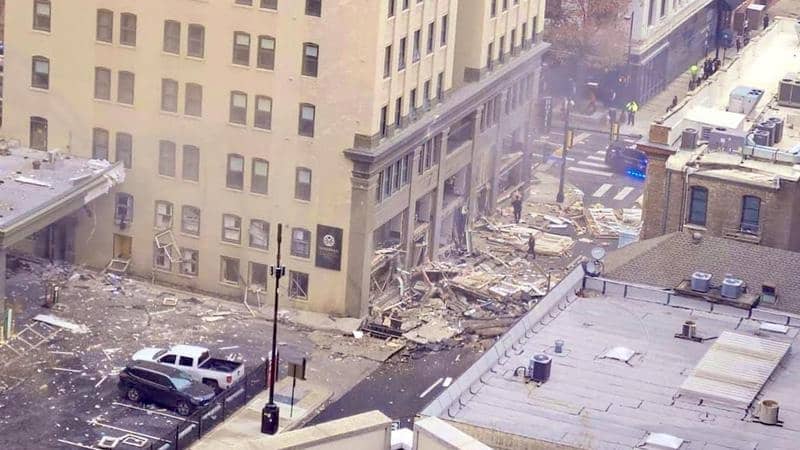
Can I Sue for a Gas Explosion?
Injured in a Gas Explosion? Understand Your Rights
Gas explosions are a growing concern nationwide. The blast at a historic hotel in Texas that left 21 people injured and littered the streets of downtown Fort Worth with debris is just the latest high-profile incident where a suspected gas leak led to a massive explosion in which multiple people were hurt. (NOTE: The cause of the Fort Worth hotel explosion has yet to be determined, but at least one witness reported smelling gas.)
An explosion is a devastating event. It can lead to serious injuries, and it is not uncommon for one or more people to be killed. Burg Simpson Law Firm understands the devastating toll these accidents can take, and we are proud to provide knowledgeable legal representation for the victims of explosions and their families nationwide.
Our attorneys have obtained millions of dollars on behalf of those injured in gas explosions. Several of these cases went to trial, where we fought—and won—substantial awards for our clients.
View Our Results
If you have been injured in a gas explosion or a member of your family was seriously hurt or killed, it is important to explore your legal rights and options as soon as possible. Call Burg Simpson Law Firm at 888-895-2080 today for a FREE and confidential case evaluation.
What Happened in Fort Worth?
On January 8, an explosion occurred at Fort Worth’s Sandman Signature Hotel. The Fort Worth hotel explosion resulted in blown-out windows, debris scattered throughout downtown streets, and 21 reported injuries. Fifteen people injured in the blast required hospitalization, with one victim in critical condition and six in semi-critical condition.
The hotel, located in a busy area one block from the Fort Worth Convention Center, had a restaurant under construction; however, it is not confirmed if the explosion originated there. Atmos Energy, a natural gas distributor, and the Railroad Commission of Texas, the state’s oil and gas regulator, are examining the blast site in an effort to identify the cause.
What This News Means for the Victims of Gas Explosions
Incidents like the Fort Worth hotel explosion happen with alarming regularity. Gas explosions can happen anywhere, from homes to major commercial properties. Some result in significant property damage, while others can lead to catastrophic injuries and even loss of life.
Read More: Burg Simpson Represents Victims of Gas Explosions
Due to our experience litigating injury cases arising from gas explosions, the attorneys at Burg Simpson Law Firm are highly sought after authorities on the subject. We view it as our duty to inform victims what rights they have following a gas explosion.
Who Is Liable for Damages in a Gas Explosion?
The right to sue following a gas explosion accident is contingent on proving that someone else is at fault. A comprehensive investigation of the incident is required to determine if negligence was a factor.
Liable parties in a gas explosion case may include:
- Utility companies
- Property owners
- Companies that install and maintain gas lines, appliances, etc.
- Individuals and entities performing construction or excavation in the area
- Product manufacturers
One or more of these parties may be held liable for damages if their negligence causes a gas leak and subsequent explosion. You may be entitled to compensation for personal injury from one or more defendants.
The same applies if someone you love dies as a result of a gas explosion for which someone else is at fault. Compensation for the damages you and your family suffer may be obtained through a wrongful death lawsuit.
How Do I Prove Negligence?
Most personal injury claims are brought on the basis of negligence. Potential examples of negligence in a case arising after a gas explosion include failure to maintain and repair gas lines, incorrectly installing gas appliances, performing construction without proper permits, etc.
There are four principal elements of any negligence-based claim:
1. The Duty of Care
First, you must show that the defendant owed you a legal duty of care. As a rule, this duty is based on the reasonable person standard, meaning that individuals are expected to act as a reasonably prudent person would under similar circumstances. The specific duty of care may vary depending on the relationship between the parties and the situation at hand.
2. Breach of Duty
Next, you must demonstrate that the defendant breached that duty. A breach occurs when the defendant fails to meet the standard of care expected under the circumstances. This could involve actions taken by the defendant or, in some cases, a failure to act when there was such a duty.
3. Causation
The defendant’s negligence must be established as the cause of your injuries. For a defendant to be held liable, the potential for harm must have been a foreseeable result of the defendant’s actions.
4. Damages
Finally, you need to prove that you (and, if applicable, your family) sustained compensable damages as a result of the explosion. You may be entitled to compensation for personal injury, property damage, and/or wrongful death.
Types of Damages in a Gas Explosion Case
The damages available in your case depend on the specific losses. An experienced lawyer can collect evidence and consult experts to accurately calculate the value of your claim, as well as fight for maximum compensation on your behalf.
Compensation that may be recovered for injuries in a gas explosion includes:
Economic Damages
These are the actual financial losses you suffer as a result of your injuries. You may be entitled to recovery of the following:
- Medical expenses
- The cost of future medical care
- Lost wages
- Property damage (such as damage to or the loss of your home, personal belongings, etc.)
- Loss of earning capacity
- Out-of-pocket expenses, such as home and vehicle modifications, the cost of travel for medical treatment, etc.
Non-Economic Damages
Non-economic damages refer to the intangible losses a person may experience. Unlike economic damages that are measurable, non-economic damages are subjective and aim to compensate for the human and emotional toll of an injury or other harm.
You may be entitled to the following non-economic damages:
- Pain and suffering
- Emotional distress
- Loss of consortium
- Permanent disability
- Scarring and disfigurement
- Loss of enjoyment of life
Many states impose caps on non-economic damages. A qualified attorney can advise you of any potential limitations in your state.
Punitive Damages
Punitive damages are additional monetary awards intended to punish a defendant for particularly reckless or egregious conduct. Unlike compensatory damages that aim to compensate the plaintiff for losses, punitive damages are designed to deter the defendant and others from engaging in similar harmful behavior in the future.
Not all states allow punitive damages, and many impose caps on such awards. Knowledgeable lawyers can determine if the defendant’s conduct meets the threshold for punitive damages.
Contact a Gas Explosion Lawyer Today
The Fort Worth hotel explosion is by no means an isolated incident. If you have been injured by a gas explosion anywhere in the country, you should seek legal counsel as soon as possible.
Burg Simpson is a national law firm with offices in Arizona, Colorado, Florida, Nevada, Ohio, and Wyoming. Our firm has extensive experience with complex personal injury claims, including cases arising due to gas explosions.






